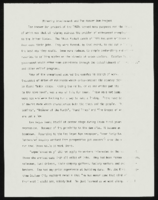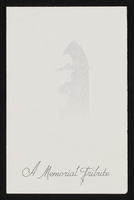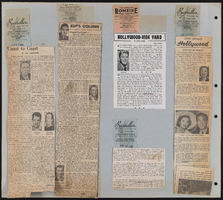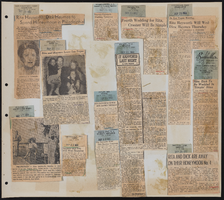Search the Special Collections and Archives Portal
Search Results

Roadrunners Internationale Banquet presentations, October 6, 2005
Date
Archival Collection
Description
Text
Joe Andre Photograph Collection
Identifier
Abstract
The Joe Andre Photograph Collection (approximately 1906-1980) contains photographic prints, postcards, and negatives documenting Joe Andre’s life. The images in this collection document his involvement in the United States Marine Corps Band and his days as a touring musician throughout the northwest and southwest United States. Also included are photographs of family vacations and businesses he owned in Beatty, Nevada.
Archival Collection
Pueblo Grande de Nevada Photograph Collection
Identifier
Abstract
The Pueblo Grande de Nevada Photograph Collection (approximately 1920-1980) contains black-and-white photographic prints, negatives, and slides depicting archaeological sites located in Overton, Moapa, Valley of Fire, Red Rock, Pyramid Lake, Kane Springs, Virgin River, the “Lost City,” and Lake Mead, Nevada. Images display the different stages of digging during the archaeological excavation of Pueblo Grande de Nevada. Also included are images showcasing artifacts uncovered during the excavations, the Saint Thomas, Nevada and the flooding of archaeological sites after the construction of the Hoover (Boulder) Dam.
Archival Collection
Wilson Family Papers
Identifier
Abstract
The Wilson Family Papers (1875-1918) document the personal and professional lives of James B. Wilson Sr., James B. Wilson Jr., and George Twison "Tweed" Wilson, early pioneers in Southern Nevada. The collection is comprised of personal correspondence, invoices and advertisements from the Wilson family business, the Sandstone Ranch, and photographs of the extended Wilson family.
Archival Collection
Albert S. Henderson Papers
Identifier
Abstract
The Albert S. Henderson Papers (1879-1962), document his career and service as a district judge in Las Vegas, Nevada. Included are correspondence, a personal statement from his election campaign, certificates and proclamations, his memorial book, numerous newspaper clippings, an 1879 edition of Eureka and Its Resources, and various ephemera: union cards, name tags, and election cards.
Archival Collection

"Minority Involvement and the Hoover Dam Project": manuscript draft by Roosevelt Fitzgerald
Date
Archival Collection
Description
From the Roosevelt Fitzgerald Professional Papers (MS-01082) -- Unpublished manuscripts file.
Text

Mabel Hoggard: family materials
Date
Archival Collection
Description
Folder of materials from the Mabel Hoggard Papers (MS-00565) -- Personal papers file. This folder contains obituaries, newspaper clippings, cards, and programs.
Mixed Content

Transcript of interview with Sandra Peña by Lada Mead and Stefani Evans, March 27, 2017
Date
Archival Collection
Description
Sandra Peña’s story begins in East Los Angeles, where she spent her first fifteen years with her parents (both from Michoacán, Mexico), and her younger sister. The father's managerial position at Master Products allowed the family to live rent-free in a company-owned house behind the main factory, because he collected the rents for the company's two other dwellings. In this interview, Peña recalls the family move to Porterville, in California's Central Valley, her return to Los Angeles at nineteen, and her work with Parson’s Dillingham, a contractor for the Metrolink rail system. She draws the link between the Los Angeles and Las Vegas construction communities by describing her husband's move to Las Vegas to find work; a chance Las Vegas encounter with a friend from Chino, California; her ability to gain employment in Las Vegas at Parson’s, a company that had joint ventured with Parson’s Dillingham, and her move from there to Richardson Construction, a local minority-owned company. As Peña says, "It's kind of all intermingled. Even if you go here and you go there, it's like everybody knows everybody." Throughout, Peña weaves her family story into the narrative as she describes her youth, the birth of her son, the illness and death of her father, and her family's participation in her current employment with Richardson. As she remembers the people, places, and events of her life, Peña speaks to the ways one woman of color built on her interstate construction connections and rose in a male-dominated industry.
Text


